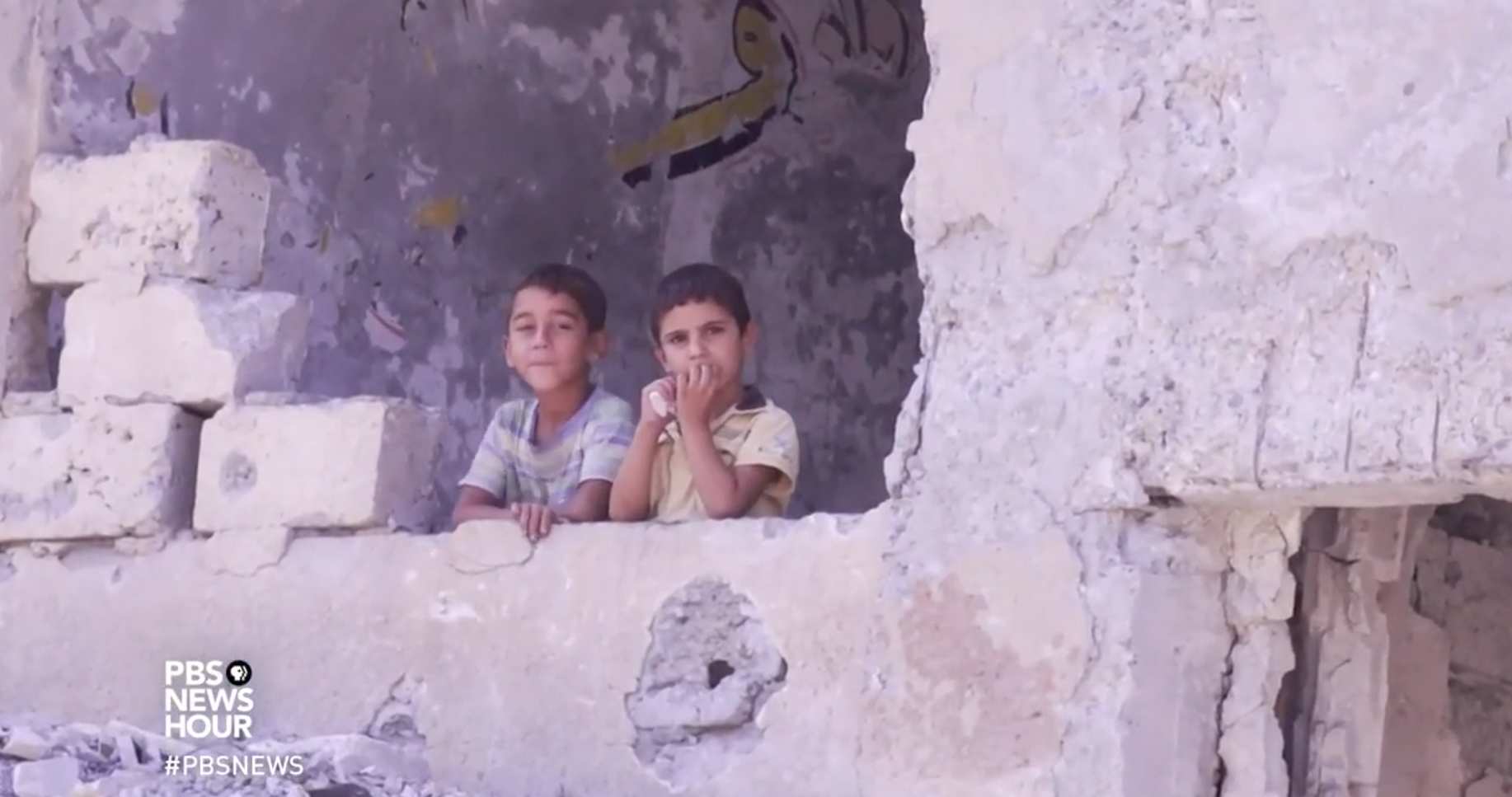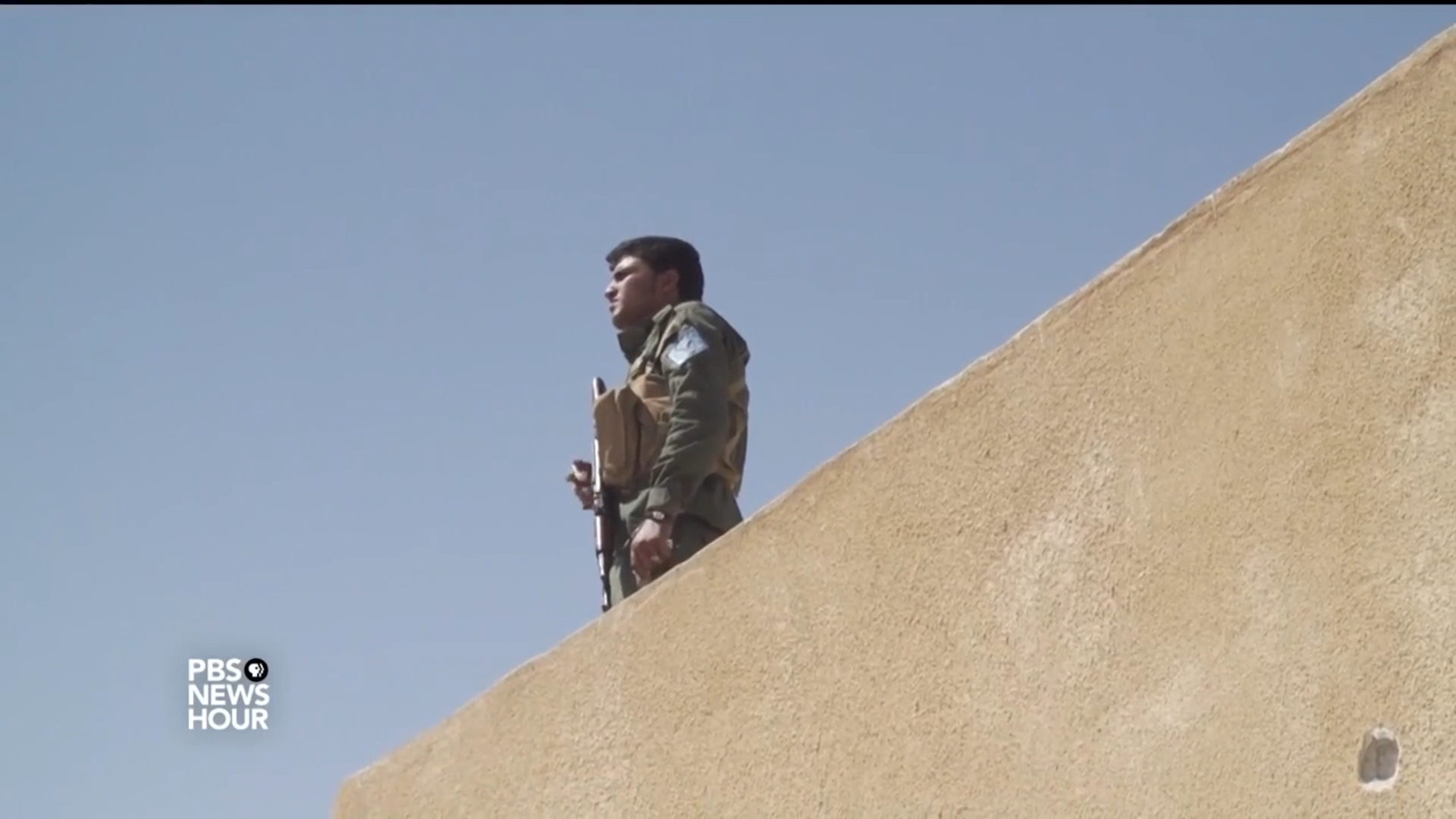
HARI SREENIVASAN: Tonight, our first in a series from Syria.
While a six-year civil war drags on, the fight against ISIS is heating up. The heart of the battle today? The northern city of Raqqa, where a U.S.-backed coalition of Kurdish and Arab fighters are working to wrest the group from its de facto capital.
The fight has been brutal, claiming thousands of civilian lives, and forcing tens of thousands of families from their homes.
From Raqqa, in Northern Syria, and with support from the Pulitzer Center on Crisis Reporting, special correspondent Gayle Tzemach Lemmon and producer Jon Gerberg report.
GAYLE TZEMACH LEMMON: In Northern Syria, the fight against ISIS has left a long, bloody trail. Towns once ISIS strongholds now lie in ruin. ISIS office buildings, the hub of its bureaucracy, now ghostly sites of death and destruction.
But here amid the rubble, just outside of Raqqa, signs of life.
SAMIA SHEIKH KHALIL, Displaced From Raqqa (through interpreter): We are staying in this home, but the landlords will come eventually. Where should we go? I wish I could go home to my family, my neighbors and relatives. We were living in peace. But there is no peace now, not even in our homes.
GAYLE TZEMACH LEMMON: In the shadow of Syria's civil war now live tens of thousands of families like this, civilians forced to flee.
The center of the battle today, Raqqa, the de facto capital of the Islamic State and the grueling campaign to drive them out. An increasingly cornered ISIS now uses car bombs and suicide attacks to slow oncoming forces.
Supported by U.S. airpower, weaponry and military expertise, the Syrian Democratic Forces, a group of Kurdish and Arab fighters, is pushing deep into the city, wresting ISIS from its four-year stronghold.
In East Raqqa City, half-a-mile from the front line, an ISIS car bomb still smoldering from this attack the day before. Coalition mortars sailing overhead. Temperatures topped 115 degrees, but soldiers' spirits were high.
HAMAS, 28-year-old Soldier (through interpreter): There are daily battles. We can be at one building, and they will be in the next. But we have made good progress from street to street. And we are the winning so far.
GAYLE TZEMACH LEMMON: They told us they were killing ISIS fighters every day. And the risk to their own lives is worth it.
DOZDAR EFREEM, 24-year-old Soldier (through interpreter): These people are our families. Every soldier we lose to free the people is worth it to us. We are ready to be killed for the freedom of the people.
GAYLE TZEMACH LEMMON: Preparing these soldiers is the work of Commander Ahmad Khalil. For 17 days, soldiers from across Syria undergo basic training, after that, the front line.
Advisers from U.S. special operations forces have helped establish these training centers, and now Syrian leaders are taking charge. One major source of concern? Ethnic division. Foreign advisers have stressed the need for a force that reflects the Syrian population, both Kurd and Arab working together side by side.
As U.S. advisers looked on, Commander Khalil underlined this priority.
AHMAD KHALIL, Shuyukh Tahtani Training Center (through interpreter): We want this example to be replicated throughout Syria. All of the people of Syria, if we are not united in fighting ISIS, we will not win.
GAYLE TZEMACH LEMMON: Forces must be ready, not just to fight ISIS, but to secure the streets afterward. About 30 miles north of Raqqa, security forces for the city are training and deploying.
WISSAM, Raqqa Internal Security Forces (through interpreter): We know the mission is very difficult.
GAYLE TZEMACH LEMMON: Wissam, a former university student, now teaches new recruits, preparing them to secure and stabilize their own communities after ISIS.
WISSAM (through interpreter): This war was forced on us, and we will defend ourselves. The new generation has paid the price for this war. Students, workers, they have all paid the price with their future. They dreamed of becoming doctors, teachers and engineers. And now we are just starting to rebuild our country, our institutions, as well as our lives.
GAYLE TZEMACH LEMMON: The long-term stability of a city like Raqqa will depend on services and governance. It's a slow, complicated effort. But this is the work that keeps wars ended.
IBRAHIM AL-HASSAN, Raqqa Civil Council (through interpreter): Rebuilding is a very difficult process, and it's very expensive. And the war is also very expensive. But we have the will to rebuild our country. And we will continue.
GAYLE TZEMACH LEMMON: Ibrahim Al-Hassan is vice chair of the newly formed Raqqa Civil Council. He says rebuilding Raqqa is in the world's interest.
IBRAHIM AL-HASSAN (through interpreter): It doesn't make sense that our people are paying the price alone. If we can eliminate terrorism here in Syria, it will not spread to France, England, or New York.
GAYLE TZEMACH LEMMON: For the U.S.-led coalition, eliminating ISIS militarily has been a fraught operation. ISIS has tightened its stranglehold on Raqqa's civilians. And the U.S. has supported the local forces with front-line advice and air support. American military leaders tout the precision of U.S. technology and weaponry.
But precision only goes so far against an enemy that hides behind civilians to protect its fighters. Sites like this school outside of Raqqa are proof. In March, a coalition airstrike leveled this three-story building, an impromptu shelter for the war's displaced. Scores were killed, mostly civilians, according to rights groups and local residents we met.
But those witnesses and U.S. officials say ISIS fighters also were present and killed in the attack. American-led airstrikes have killed at least 3,000 civilians since 2014 in the fight against ISIS, according to the monitoring group Airwars.
In the next town over, Ali Abdullah Mabrook showed me the one thing he had left of his three daughters, a single digital photograph of his youngest, Alaa. Mabrook told us his three daughters were killed when a coalition airstrike leveled his family's home.
ALI ABDULLAH MABROOK, Daughters Killed in Airstrike (through interpreter): I have been working for 45 years to build this house. How can I do it again now? Where should I go? Does Trump think that all of us are businessmen with billions of dollars? We are people without enough food for the day. Will he give me money now to build my house? Now I sleep in the streets now.
GAYLE TZEMACH LEMMON: But his wife pointed fingers much closer to home. She said ISIS fighters, living on her street, had been using her house as a base. It was revenge against her son, who was battling the Islamic State with the Syrian Democratic Forces. By fighting from her roof, she says, ISIS made her house a target.
KHOWLA MUHAMAD MABROOK, Daughters Killed in Airstike (through interpreter): They knew they would be targeted, but the Islamic State wanted this. They came so my home would be targeted. What else should I say? May God take our revenge.
Three girls, they were well-educated. They had their university certificates and all.
GAYLE TZEMACH LEMMON: Abdulsalam Hamsourk recently learned his Raqqa home was destroyed in an airstrike. But he told us he was happy. The strike killed several ISIS fighters.
Today, he works north of Raqqa, helping families caught in this brutal war. Tens of thousands have arrived at this camp run by Raqqa Civil Council.
ABDULSALAM HAMSOURK, Raqqa Civil Council (through interpreter): We will fulfill our responsibility to our people. We will not say no to anyone. As a council and as residents ourselves, we will help our people.
GAYLE TZEMACH LEMMON: In the camp, we met Batoul. She was eight months pregnant when she led her toddler and sick husband out of Raqqa City. She gave birth to her two-week-old daughter here at the camp.
BATOUL, Fled Raqqa With Family (through interpreter): There was a lot of violence. You could see it all. One time, I went to the doctor with my daughter when she was sick and we saw a beheading. We tried to run away from that area. They didn't allow anyone to escape.
GAYLE TZEMACH LEMMON: Eventually, she says airstrikes and fear for her family compelled her to risk reprisal and flee.
Will you tell your daughter about all of this one day?
BATOUL (through interpreter): I will. I will tell her you were not born in your home. You were born here in the camp.
The most important thing is for all of us to return and live together and for our kids to have a nice life, because this war is not their fault. And we hope for a better future for them, better than we had.
GAYLE TZEMACH LEMMON: It's her story now, all of this.
BATOUL (through interpreter): We suffered a lot under ISIS. And we hope to go back. If it is the Syrian Democratic Forces or anyone, if they will bring security, we just want to go home.
GAYLE TZEMACH LEMMON: But for now, this is what home looks like for so many Raqqa families.
Inside this bombed-out building, the Khalil family struggles to forge ahead. The women clean and wash the dishes. The men salvage scrap metal from the wreckage they're living in.
Outside, the stench of corpses rotting reeked in the rubble underfoot, but inside we found a home, made bright with the sounds and colors of their 20-person family.
They welcomed us in and they told a story of the hell of living under ISIS and of despair at their family's displacement.
SAMIA SHEIKH KHALIL (through interpreter): We left everything behind. We had been saving for 35 years. And we were safe there. Then we left everything in one helpless moment.
GAYLE TZEMACH LEMMON: What of the toll this has taken on your family?
SAMIA SHEIKH KHALIL (through interpreter): Whatever I say, it won't describe the suffering we have seen. I am devastated deep inside. I feel the pain of all Raqqa's people as the pain of my own family. I can feel the injustice, how people lose their children. Even those who survived have nothing.
GAYLE TZEMACH LEMMON: Nothing except the hope that the fight will someday end, and that her family can return to Raqqa and build their home once more.












